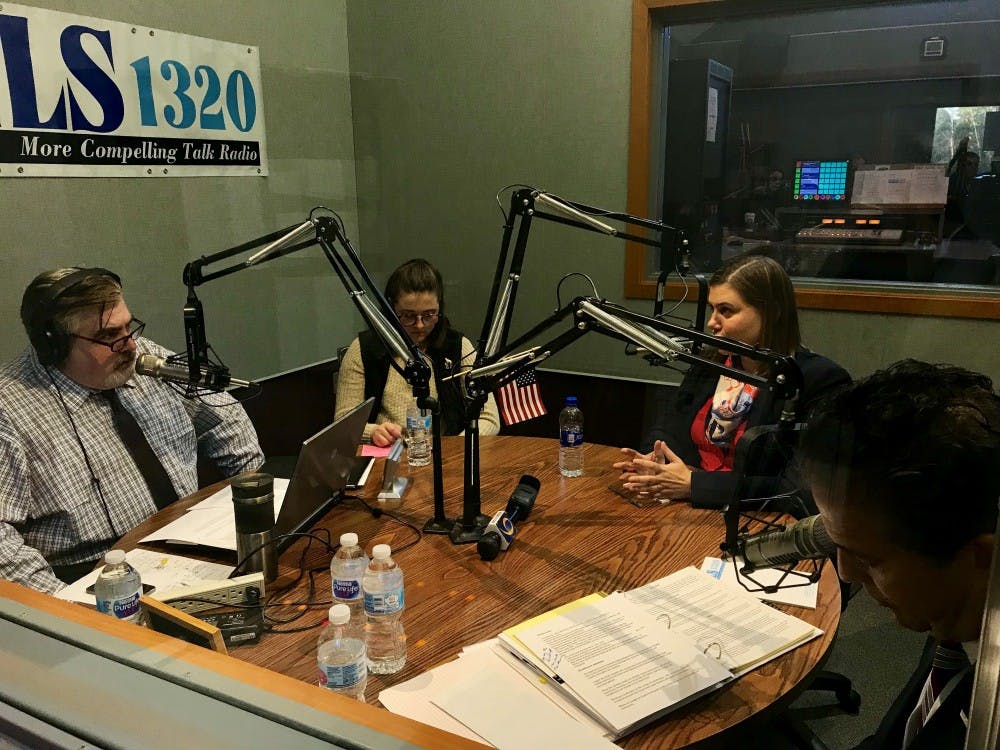Incumbent U.S. Rep. Mike Bishop, R-Mich., faced his Democratic challenger, Elissa Slotkin, in the second of three debates Tuesday. Here are the key takeaways.
Plans to reduce student loan debt

Incumbent U.S. Rep. Mike Bishop, R-Mich., faced his Democratic challenger, Elissa Slotkin, in the second of three debates Tuesday. Here are the key takeaways.
Plans to reduce student loan debt
Both candidates were in agreement that student loan debt needs to be addressed as quickly as possible. How they plan to do that differs, however.
“It’s fundamentally different than it was a generation ago, where if you just think back at Michigan State University 50 years ago the state paid 75 percent of tuition, the student paid 25 percent. Now it’s the exact opposite – the state pays 25 percent, and the student pays 75 percent,” Slotkin said. “The thing I would do to fix the situation most immediately is cap any student loan at 2.5 percent (interest). Getting a loan for any type of higher education is fundamentally different than getting a loan to build a deck on your house.”
Slotkin also said students who currently have loan debt should have an opportunity to refinance their loans at a 2.5 percent interest rate.
Bishop said it should not be up to the federal government to determine interest rates, but that students should be granted more freedom when it comes to refinancing their loans.
“One of the first things I did when I was elected to Congress was work with the Obama administration to ensure that the grant system was working properly. I had a bill passed and signed by the president to ensure that people who don’t have the financial ability to pay were able to continue on with these grants,” Bishop said. “I also believe in a one grant, one loan system. I think if you have a student loan, you should be able to take that loan anywhere and not be just financed by the federal government but should be able to refinance it in any way you want to.”
Most expensive House race in Michigan history
With three weeks left before the election, the race in Michigan’s 8th Congressional District has already shattered records to become the most expensive congressional race in Michigan history.
It’s an issue that Slotkin said almost kept her out of the race.
“I’m a first-time candidate. I’ve never run for office — I’ve had a career in national security — so when I started understanding the math in our campaign finance laws, it almost kept me out. To me, one of the things I hear most routinely wherever I’m going is people feeling like the role of money in politics is toxic,” Slotkin said. “I made the decision back in January to not take any corporate PAC money. That’s something I felt was a matter of integrity, and I’ve been very proud that over 90 percent of our donations are from individuals. I believe that we have to hold our elected officials to a higher standard. They have to take it upon themselves to help regain faith in the system.”
Bishop criticized Slotkin for taking money from outside the district despite her pledge.
“We’re hearing from somebody who has done nothing but accept money from every corner of our country, from Hollywood to New York. She’s been traveling with Nancy Pelosi all over California, all over the East Coast, doing whatever she can to vacuum and suck up all the elitist money out there,” Bishop said. “For her to preach about not taking corporate PAC money is insulting, because 90 percent of her money comes from outside the district, and all of it comes from special interest money. For her to sit here and claim that she is above all of that and that the money almost kept her out of the race, is a ridiculous statement and it’s intended to mislead.”
Midterms as a measuring stick of the president
Some voters view midterm elections as a referendum on the party that controls the White House. That’s a problem, Bishop said.
Support student media! Please consider donating to The State News and help fund the future of journalism.
“I’d like to hope that’s not the prism by which people make their decision. We have had a great opportunity in this district over the years to represent this community. I’m proud to have been born and raised here, I have a great connection here, I have a great team that’s worked very hard with this community on local issues,” Bishop said. “All politics are local, and it’s important that we not get wrapped up in the national side. Frankly, I don’t live in Washington, D.C. I’m the only one of the candidates that doesn’t have a home in Washington, D.C. And I will never live in Washington, D.C. because I believe the most important part of this district is the district.”
While Slotkin agreed that the election should be decided based on local issues, she pushed back on the validity of Bishop’s claims to be the local candidate.
“Mr. Bishop likes to tout his local credentials, but if you don’t go out and talk to people every day, you don’t meet in a truly public forum for 24 months, you don’t actually hear and have people stop you when you’re outside your neighborhood talking to you about health care, prescription drugs … It’s one thing to say yes, I live here; it’s another to actually go out and talk to the people that you want to represent,” Slotkin said.
Listen to the full debate: